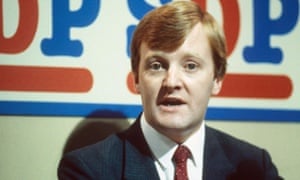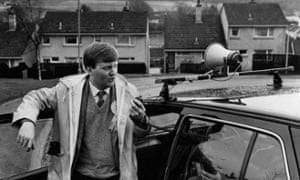Charles Kennedy obituary
Popular Lib Dem politician, known for his charm and wit, who led his party to one of its best general election results
Charles Kennedy, who has died suddenly aged 55, was a highly popular leader of the Liberal Democrat party, famed for his geniality and wit, who was brought low and forced from the leadership by alcoholism. When he was first elected for the short-lived Social Democratic party (SDP) in the vast Scottish Highlands constituency of Ross, Cromarty and Skye, in the 1983 general election, at 23 he was the youngest MP in the Commons. He lost his seat at the general election last month in the Scottish National party landslide.
Leading the Lib Dems in two general elections, in 2001 and 2005, he was instrumental in achieving the party’s best result for 80 years when it won 62 seats in the latter contest, which is likely to remain for the foreseeable future its electoral high-water mark. It was no secret that he was disenchanted with the direction the party took following his defenestration in 2006 and particularly with its decision to enter the coalition government in 2010. The latest election’s outcome must have come as a particularly heavy political as well as personal blow to him.

But Kennedy, red-haired and round-faced, a cheery and approachable figure, with a soft Highlands accent, will generally be remembered less for his political achievements than for the persona he exhibited in numerous television appearances, which stretched well beyond political programmes. Some envious colleagues marvelled at his easy charm and wry sense of humour, which chimed well with the public increasingly wary of dour, cautious and manipulative soundbite, party-line politicians, though it also earned him the sobriquet “chatshow Charlie”.

To the public, he scarcely seemed like a politician at all. “I make no apologies,” he told an interviewer, “for the fact that I am a paid-up member of the human race.” But there was more than an element of schadenfreude in the whispers about his drinking, which led to his downfall a few months after the party’s greatest electoral success. In truth, however, the gossip had been around in Westminster for some time and there were increasing doubts about whether he could continue to handle the high-profile pressure of the leadership.
Unlike many third-party politicians in a first-past-the-post electoral system, Kennedy did not have a struggle to get elected. He was born in Inverness and raised in Fort William, in the heart of what would become his constituency. He came from a well-known local Roman Catholic family, the younger son of a crofter, Ian Kennedy, and his wife, Mary (nee MacEachen), who were both enthusiastic folk singers. It was a close family and, as the local MP, he would later live next door to them.
He attended Lochaber high school, Fort William, before going on to study politics and philosophy at Glasgow University. It was there that he acquired an early nickname – taxicab Charlie – for his reputed aversion to physical exercise and there too that he joined the SDP, then newly formed by moderate and rightwing Labour politicians averse to the leftwards direction that their old party was then taking.
Kennedy became president of the university’s student union – it admitted women as well as men for the first time during his term of office – and won a national student debating competition. After graduation he joined BBC Scotland as a journalist – the only career outside politics that he ever had – and then, within months, won a Fulbright scholarship to study at Indiana University in the US. It was while he was there that he obtained the party’s nomination for the Scottish constituency and he returned home to be unexpectedly elected to Westminster six weeks later, in what had previously been a Tory seat, in the 1983 Thatcher post-Falklands landslide.
Ross, Cromarty and Skye, later renamed Ross, Skye and Inverness West in 1997, and then renamed again as Ross, Skye and Lochaber in 2005, is the largest constituency by size in the British Isles, covering a sixth of Scotland and stretching from the borders of Inverness and the Black Isle across to Skye off the west coast: Kennedy held the seat through six elections thereafter. As the SDP crumbled in the mid-1980s, Kennedy was one of the first of its handful of MPs to urge a merger with the Liberals, with whom it had been in electoral alliance. After the foundation of the merged Liberal Democrat party in 1987, he assumed a number of frontbench spokesmanships – in such a small party it was a necessity – and became party president in 1990.
The Lib Dems’ electoral fortunes were revived throughout the decade under the leadership of its gung-ho former Royal Marine veteran Paddy Ashdown who eventually stood down in 1999 following the Blair electoral landslide, which ruined his hopes of a ministerial place in a coalition Lib-Lab government. Kennedy was clearly the best-known and most charismatic party figure to succeed him and he duly won 57% of the vote against the 43% polled by Simon Hughes, the party’s perennial leadership runner-up, under the alternative vote system. He was the first Catholic to lead the party and, for a brief period in the early 2000s, for the first time since the Reformation, all three party leaders were either Catholics – Kennedy and Iain Duncan Smith – or heading that way – Tony Blair.
As leader, Kennedy saw little reason to change his relaxed style and continued to appear on television programmes such as the satirical Have I Got News for You, joining with gusto in its irreverent approach to politics and his fellow politicians, while winging his way fluently, if not always knowledgably, through policy press conferences. It did him no harm at all with the electorate, who saw him as a more genuine person than most of those at Westminster and the one they would most like to share a drink with. His popularity with the public did not suffer when he led the party’s opposition to the Iraq war when both major parties were supporting it.
Kennedy led the party to an improved showing in the 2001 general election, when it captured more than 18% of the vote and, more importantly, 52 seats – not a breakthrough, but giving the party a sizeable phalanx of MPs, several of whom had been elected at earlier byelections and held their seats. Their leader waged an energetic, if somewhat unfocused, campaign, jetting across the country exhaustingly in a chartered plane and by bus, meeting few voters but appearing on local television news programmes, before returning to London each day.
The strategy was repeated in the 2005 election four years later, during which the party announced its plan to target marginal Tory seats where Lib Dems held strong second places. By then, however, the cracks in Kennedy’s performance were beginning to show, with a particularly striking appearance during an early-morning press conference where he was incapable of explaining the details of the party’s policy for a local income tax. This was laughed off at the time as the result of a sleepless night caused by his new-born son, Donald, but was recognised by close colleagues as a sign of a deeper failing, which had begun to affect his Commons appearances, including not showing up in the house to respond as party leader to a budget speech in 2004.
Although the party gained seats in 2005, winning 62, its best electoral performance since 1923, and 22% of the national vote, it was perceived to have fallen short. The anticipated breakthrough in the Tory marginals did not happen and, far from becoming the main opposition as some activists had hoped, it remained a distant third in the Commons. Kennedy was blamed internally for concentrating on trying to attract Tory voters rather than broadening the party’s electoral appeal with more progressive electors disillusioned with Labour, but he was nevertheless re-elected leader shortly after parliament returned.
Within months, the whispers about his drinking surfaced in public for the first time. Senior party MPs were rumoured to have warned him to improve his performance and, in January 2006, he was told that ITN planned to run a story about his having treatment for alcoholism. Kennedy, who had always publicly denied having a drinking problem, called a press conference, confirmed that the story was true and asserted that he had not had a drink for several months.
It was not enough to save his career: the party’s MPs, including his closest associates, drifted away from him with several saying they would no longer serve under him. Within a day he had resigned and his fellow Scottish MP Menzies Campbell – nearly 20 years older than him – was made interim leader.
Kennedy later cut a forlorn figure, no longer in such great demand for television and regarded as someone who had been succeeded by a younger generation and yet was now not regarded as having the gravitas of a senior statesman. When he made clear that he was unhappy with the party leadership’s coalition with the Tories in 2010, he was ignored and not offered a ministerial job. In 2008 he was appointed president of the pro-EU European Movement and the same year elected rector of Glasgow University, re-elected in 2011. He also agreed to campaign for the cross-party Better Together group, opposing Scottish independence in the 2014 referendum.
His marriage to Sarah Gurling, a public relations officer, Lib Dem activist and sister of a friend, ended in divorce in 2010. Kennedy is survived by their son.
• Charles Peter Kennedy, politician, born 25 November 1959; died 1 June 2015
沒有留言:
張貼留言